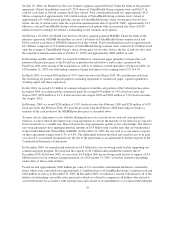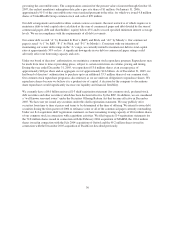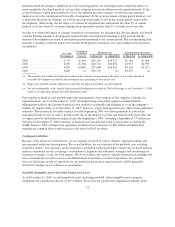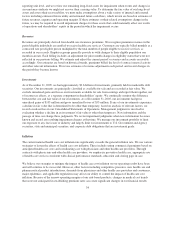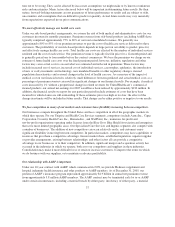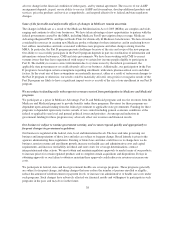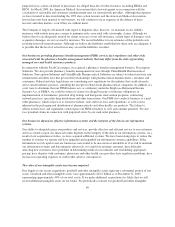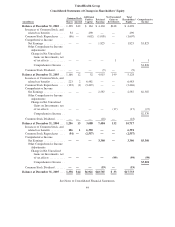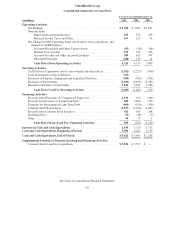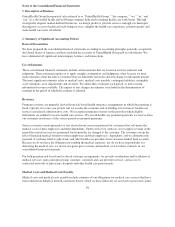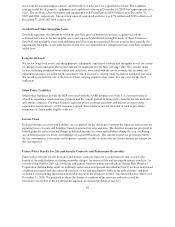United Healthcare 2005 Annual Report Download - page 40
Download and view the complete annual report
Please find page 40 of the 2005 United Healthcare annual report below. You can navigate through the pages in the report by either clicking on the pages listed below, or by using the keyword search tool below to find specific information within the annual report.adverse change in the financial condition of either party, and by mutual agreement. The success of our AARP
arrangement depends, in part, on our ability to service AARP and its members, develop additional products and
services, price the products and services competitively, and respond effectively to federal and state regulatory
changes.
Some of the favorable and unfavorable effects of changes in Medicare remain uncertain.
The changes in Medicare as a result of the Medicare Modernization Act of 2003 (MMA) are complex and wide-
ranging and continue to affect our businesses. We have taken advantage of new opportunities to partner with the
federal government created by the MMA, including Medicare Part D prescription drug coverage, Medicare
Advantage Regional PPOs, and Special Needs Plans for chronically ill Medicare beneficiaries. We have invested
considerable resources in creating new Medicare product offerings for these initiatives and in analyzing how to
best address uncertainties and risks associated with these new programs and other changes arising from the
MMA. In particular, the Part D program presents challenges because of the size and scope of the new program.
Our ability to successfully participate in the Part D program depends in part on coordination of information and
information systems between us, CMS and state governments. We have been working with CMS to correct
systems issues that they have experienced with respect to certain low income people eligible to participate in
Part D. The inability to receive correct information due to systems issues by the federal government, the
applicable state government or us could adversely affect our business. Additionally, our participation in the Part
D program is based upon certain assumptions regarding enrollment, utilization, pharmaceutical costs and other
factors. In the event any of these assumptions are materially incorrect, either as a result of unforeseen changes to
the Part D program or otherwise, our results could be materially affected. Any positive or negative results of the
Part D program are likely to have a significant impact on us as a result of the size of our enrollment in our Part D
program.
We are subject to funding risks with respect to revenue received from participation in Medicare and Medicaid
programs.
We participate as a payer in Medicare Advantage, Part D, and Medicaid programs and receive revenues from the
Medicare and Medicaid programs to provide benefits under these programs. Revenues for these programs are
dependent upon annual funding from the federal government or applicable state governments. Funding for these
programs is dependent upon many factors outside of our control including general economic conditions at the
federal or applicable state level and general political issues and priorities. An unexpected reduction in
government funding for these programs may adversely affect our revenues and financial results.
Our business is subject to routine government scrutiny, and we must respond quickly and appropriately to
frequent changes in government regulations.
Our business is regulated at the federal, state, local and international levels. The laws and rules governing our
business and interpretations of those laws and rules are subject to frequent change. Broad latitude is given to the
agencies administering those regulations. Existing or future laws and rules could force us to change how we do
business, restrict revenue and enrollment growth, increase our health care and administrative costs and capital
requirements, and increase our liability in federal and state courts for coverage determinations, contract
interpretation and other actions. We must obtain and maintain regulatory approvals to market many of our products,
to increase prices for certain regulated products and to complete certain acquisitions and dispositions. Delays in
obtaining approvals or our failure to obtain or maintain these approvals could reduce our revenue or increase our
costs.
We participate in federal, state and local government health care coverage programs. These programs generally
are subject to frequent change, including changes that may reduce the number of persons enrolled or eligible,
reduce the amount of reimbursement or payment levels, or increase our administrative or health care costs under
such programs. Such changes have adversely affected our financial results and willingness to participate in such
programs in the past, and may do so in the future.
38



